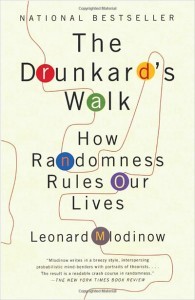“The Drunkard’s Walk: How Randomness Rules Our Lives”
Professor Leonard Mlodinow visits Google’s Mountain View, CA headquarters to discuss his book, “The Drunkard’s Walk: How Randomness Rules Our Lives”. This event took place on May 22, 2008, as part of the Authors@Google series.


Mark Twain
Dear Professor Mlodinow,
I read with great pleasure your book “The drunkard’s walk”. Not only because it is well written, but also because it narrates interesting stories which, in a way, confirm my opinions. We usually appreciate mostly those who tell (in a more articulated manner) what we already had in our mind.
Let me add a small remark. I expected to find, towards the end, a quotation from Mark Twain’s short story you most likely know, “Captain Storfield’s visit to heaven”, from which can be seen as a forerunner. In my edition the story begins on page 213 and ends on page 263. The lines below are on pages 245-6.
Captain Storfield comes to heaven and an “old bald-headed angel by the name Sandy McWilliams” shows him around. At a certain point the angel explains that in heaven there is a strict ranking and that “Shakespeare [despite the fact that he is considered a prophet] has to walk behind a common taylor, by the name of Billings, and behind a horse-doctor, named Sakka, from Afganistan…”
The captain is surprised: “But why did they throw off on Shakespeare, that way, and put him away down there below those shoemakers and horse-doctors, and knife-grinders—a lot of people nobody ever heard of?”
The angel answers: “That is heavenly justice of it—they warn’t rewarded according to their deserts on earth, but here they get their rightful rank. That taylor Billings, from Tennessee, wrote poetry that Homer and Shakespeare couldn’t begin to come up to; but nobody would print it, nobody read it but his neighbors, an ignorant lot, and they laughed at him.”
I would be glad to get a response to this message. It would make me fill a little bit less of a Billings sort of person.
With best regards,
Prof. Aljosa Volcic
University of Calabria
volcic@unical.it
Respected Professor,
This is regarding your book THE GRAND DESIGN. It appears you are in support of Grand Design. Is it true?
Feynman’s theory of infinite paths of a particle appears out of reality. Even then, how can the particle go through all the possible paths? It could take only one out of all the possibilities. At least after the particle reaches its destination, the path must be identifiable.
Going from top to bottom must be restricted to that one path only. After all, all the cosmology is going from present to the past. Feynman complicated the quantum theory, instead of explaining it.
I am only a lay man interested in popular science. These are just some of my doubts after going through the book. These doubts may sound shallow. Please ignore.
J.L.Jawahar.